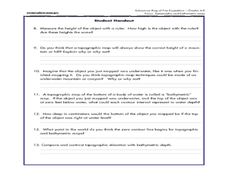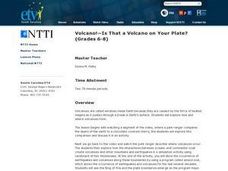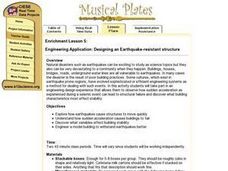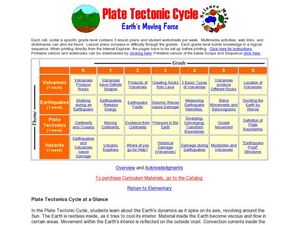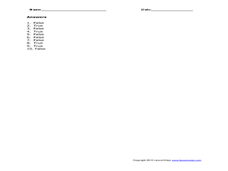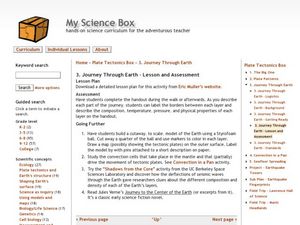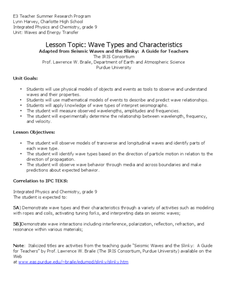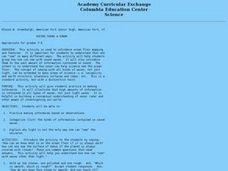Curated OER
Wave Superposition: Interactive On-line Mac and PC
Students study definitions of wavelength, wave speed, wave amplitude, and wave period using an interactive JAVA environment. Distance and time are given so speed=wavelength/period can be verified or deduced by students. Waves reflection...
Curated OER
A Watered-Down Topographic Map
Eighth graders explore the ocean floor. For this topography lesson, 8th graders compare topographical maps to bathymetric charts. They will create a topographic map and note landmarks and other land features.
Curated OER
Volcano! Is That a Volcano on Your Plate?
Students investigate where volcanos come from. In this volcano lesson, students watch videos do Internet research and participate in experiments to discover the cause of volcanos.
Curated OER
Designing an Earthquake-resistant Structure
Young scholars attempt to design and build the most stable "earthquke resistant" structure. They create model buildings and test them on a shake table to see which design holds up the best.
Curated OER
Does that Sound Right to You?
Ninth graders are introduced to the components of compressional and transverse. They practice answering speed problems involving different mediums that waves travel trhough and then review the wave PowerPoint. They then visit physics...
Curated OER
Electromagnetic Spectrum
Students define electromagnetic radiation, list major categories and uses of electromagnetic waves, identify potential health risks with electromagnetic waves, and demonstrate understanding of Plank's constant by solving quantitative...
Curated OER
Anatomy of an Earthquake
In this earthquake worksheet, students read and study earthquake maps and statistics. They complete 8 short answer questions that follow.
Curated OER
Plate Tectonic Cycle
Students explore the Earth's movements by completing worksheets. In this plate tectonics lesson, students define such natural disasters as volcanoes, earthquakes, tsunamis and mudslides and discuss their connections to plate tectonics....
Curated OER
Magnetorheological Fluids
Students conduct a series of experiments on magnetorheological fluids. In this physics lesson, students explain how these fluids behave in varying magnetic field strength. They give practical applications of magnetorheological fluids.
Curated OER
Earthquake Experiments
Young scholars discuss the effects of earthquakes. For this earth science lesson, students create earthquake models and earthquake-proof buildings. They construct their own seismograph.
Curated OER
The Pacific Ocean
In this Pacific Ocean activity, students read 2 pages about the Pacific Ocean and answer true and false questions. Students answer 10 questions.
Curated OER
Chemical and Physical Changes
Eighth graders investigate different gas behaviors. In this chemistry lesson, 8th graders describe how changing volume and temperature affect gas particles motion. They collect data and make a generalization about these variables'...
Curated OER
Journey Through Earth
Students study plate tectonics. In this plate tectonics lesson students build a cutaway scale model of the Earth.
Curated OER
Roots of the Hawaiian Hotspot
Learners explain the processes of plate tectonics and volcanism that resulted in the formation of the Hawaiian Islands. They describe, compare, and contrast S waves and P waves. They explain how
Curated OER
Let the Sunshine in
Students collect and analyze data to study wavelengths of visible light. They cover Styrofoam cups with three different colors of sun filtering products and shine a lamp directly on the cups. They determine the most effective filtering...
Curated OER
Plate Tectonics
Students identify that most of mountain ranges found on all major land masses and in the oceans are external reflections of tectonic movements within the earth. They identify that earthquakes and related phenomena are caused by the...
Curated OER
Wave Types and Characteristics
Ninth graders identify the different parts of a wave. In this physics lesson, 9th graders observe wave behavior as it travels through a boundary. They determine the relationship between wavelength, frequency and velocity.
Curated OER
Creating The Virtual Model
Students engage in a lesson that is about the concept of earthquake design. The lesson includes the integration of technology and how it can be used to create buildings and structures for withstanding an earthquake. Students also define...
Curated OER
Seeing Sound and Sonar
Young scholars grasp how underwater animals can "see" using sound waves. They practice making inferences, and build a conceptual understanding of sonar radar.
Curated OER
Conducting Research
Sixth graders write research reports about trains. They focus on mechanical features of trains.
Curated OER
Motions
Ninth graders differentiate between energy waves transmitted from a quarry or mine as opposed to energy waves transmitted by an earthquake. They analyze seismograms of blast events from at least two quarries or mines. The energy waves...
Curated OER
Learning from history: can it save lives?
Pupils research and document lessons learned from this disaster, then compile and synthesize information. They write effectively for public education purposes and use visual communications tools
Energy4Me
Energy4me: Seismic Activity
Find out about the process of seismic imaging which is used in conjunction with hydraulic fracturing.



